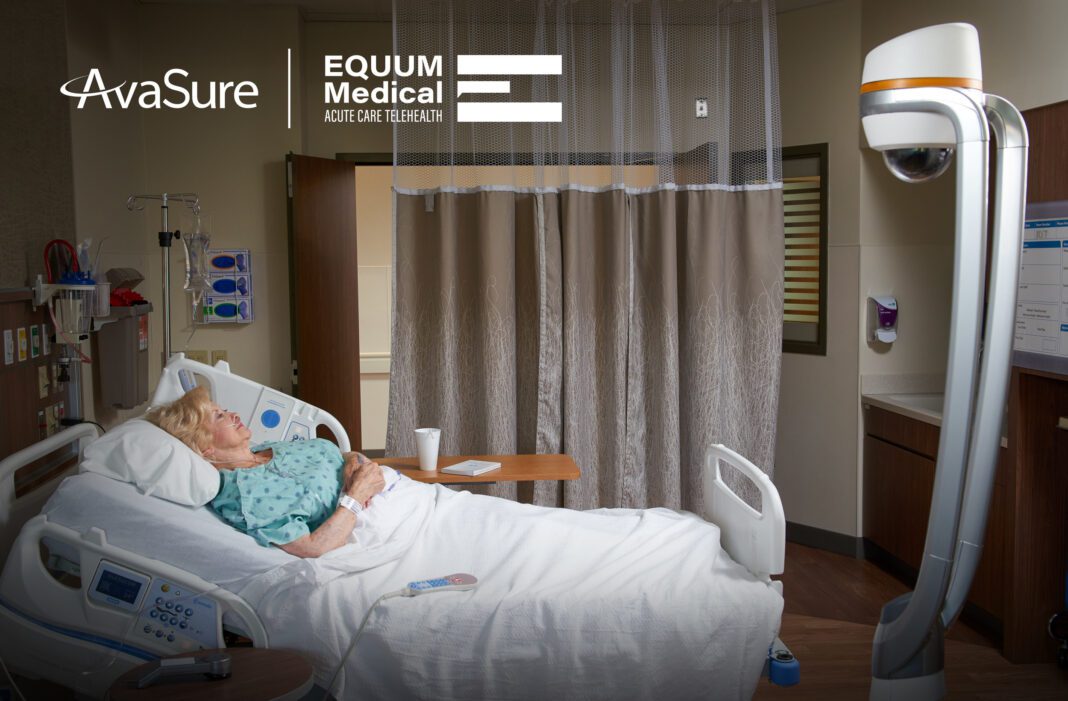AvaSure, the inventor of the TeleSitter® solution and the market leader in patient safety monitoring, and Equum Medical, a leading telehealth-enabled acute care professional clinical services company, today announced a new strategic partnership to help hospitals address the nurse staffing shortage and slow a sharp spike in adverse events in inpatient care.
Hospitals today are faced with the challenge of doing more with less. A recent study found that 30% of healthcare workers had quit or been laid off since the pandemic began, while 31% of the remaining workforce was thinking about finding another job. Prior to the pandemic, it was estimated that more than 1 million registered nurses would leave the workforce by 2030, most to retirement. With resourced care delivery at the bedside in jeopardy, adverse events are increasing, including patient falls. Nearly 1 million patient falls occur in healthcare settings, with a third being preventable, costing the U.S. healthcare system nearly $34 billion annually, studies show. With an aging population, hospital operating expenses rising, nurse safety and patient experience are at risk without the integration of new models that extend access to resources such as telehealth.
Working together, Equum and AvaSure will provide an affordable, easily adoptable and highly effective virtual monitoring solution. Equum will host monitoring services from its new Virtual Care Collaboration Center in Nashville. The service will utilize AvaSure’s hardware and software solutions, including a greater choice of room monitoring devices that provide uninterrupted uptime from thousands of hospital rooms across any geographic area.
“This partnership of telehealth leaders responds to customer demand for cost-effective solutions that make the most of increasingly scarce nursing resources,” said Lisbeth Votruba, MSN, RN, AvaSure’s chief innovation officer. “We want to free nurses to practice at the top of their license, providing clinical care instead of worrying constantly about fall-risk patients or responding to routine patient requests.”
This form of patient monitoring, in which highly trained patient safety specialists keep 24-7 watch via video and intervene via audio or alarms to stop risky behavior, comes amid a sudden rise in adverse events in hospitals nationwide, as exhausted hospital staff struggle just to keep COVID-19 patients alive.
“Equum has been helping hospitals with clinical expertise virtually for a number of years, so this is both a natural extension of our core telehealth services and a new way to address a worsening situation in patient safety,” said Corey Scurlock, MD, MBA, Equum’s CEO… “We look forward to broadening and deepening this offering to include specialist care and improve patient flow throughout the hospital.” In August, growth funding by Heritage has enabled Equum Medical to further enhance its service model and broaden the reach of its experienced team of clinicians to support new telehealth care offerings such as TeleSitter.
The companies share a common commitment to patient safety and an approach to change management within organizations that is evident in the design of the partnership. They came together to help hospital systems that may not have had the funds in the past to implement a comprehensive TeleSitter program with all the elements to implement and manage care.
Scurlock and Votruba will discuss the nurse staffing crisis and the joint solution in a webinar on March 29th. You can register at avasure.com/event/avasure-equum-webinar. Additionally, members of the new venture team will be on hand at the American Organization for Nursing Leadership (AONL) Meeting April 11-14 in San Antonio to discuss the solution.



